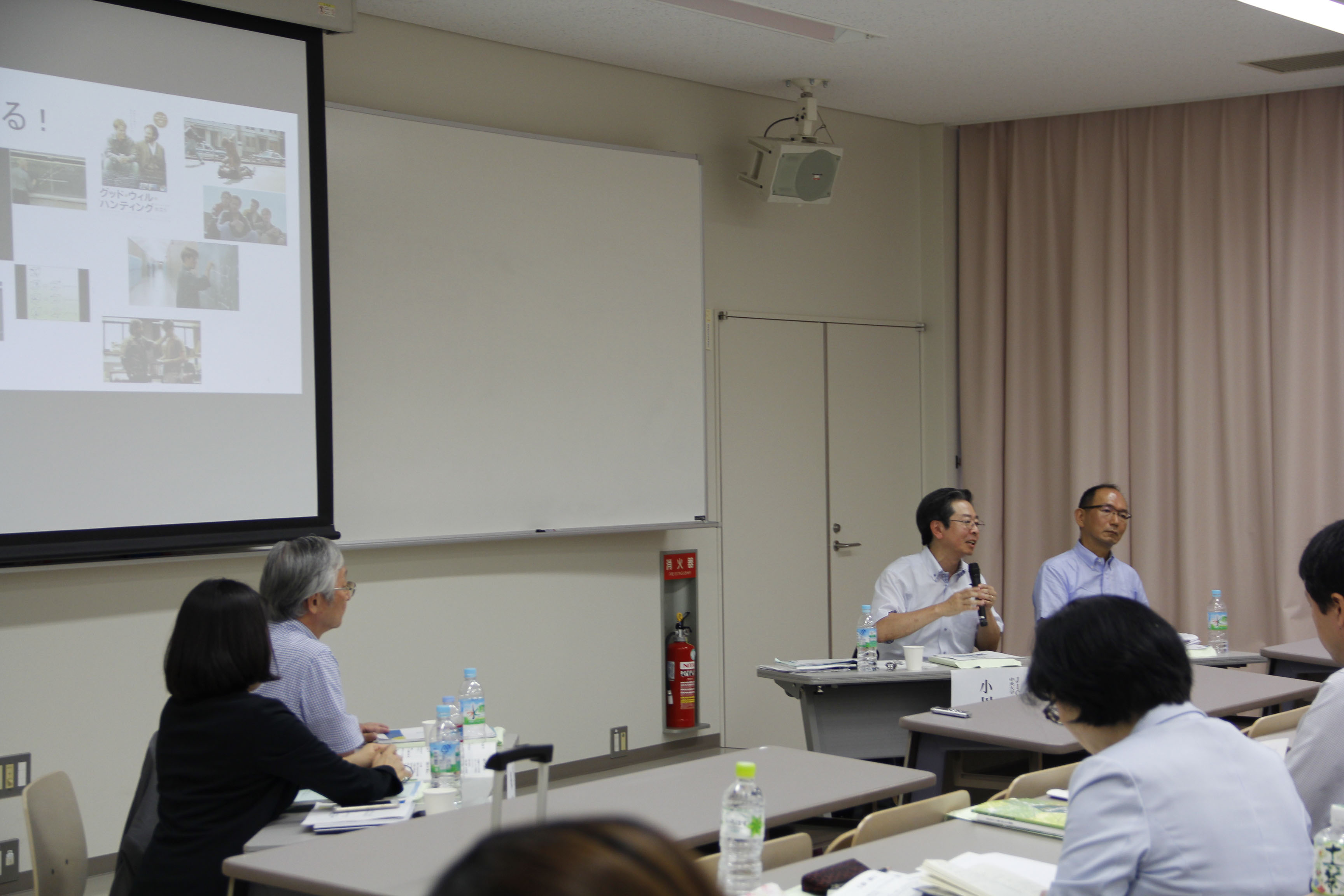Business overview
In order to contribute to the development of higher education, we are exchanging information on the initiatives and research results of each university consortium.
Overview of the 13th National University Consortium Research Exchange Forum
- theme
- Global human resource development through university collaboration
- schedule
- Saturday, September 10, 2016 13:00-20:15 (Poster session 12:00-15:15)
Sunday, September 11, 2016 9:30-11:30 - venue
- Forum Poster Session: Elisabeth University of Music (12 minutes on foot from the south exit of JR Hiroshima Station)
Information Exchange Session/Subcommittee: Hiroshima International University Hiroshima Campus (10 minutes on foot from the south exit of JR Hiroshima Station, adjacent to Elisabeth University of Music) - Co-organized by
- National University Consortium Council
General Incorporated Association Education Network China - Content
- The 13th National University Consortium Research Exchange Forum Leaflet

(Day 1)
Keynote speech: 13:20-14:20
| theme | “Human Resource Development in Hiroshima Prefecture – Hiroshima Future Challenge Vision” | |
| keynote speaker | Mr. Hidehiko Yuzaki | Governor of Hiroshima Prefecture |
Symposium: 15:15-17:30
| theme | “Developing Global Human Resources through University Collaboration” | |
| Symposium | Mr. Yasushi Nagasaka | Member of the Steering Committee of the General Incorporated Association Education Network China; Professor and Dean of the Faculty of Information Science, Hiroshima Institute of Technology |
| Toshio Suhara | Mazda Motor Corporation Human Resources Office Global Human Resources Group Manager | |
| Mr. Masao Akune | Secretary General, Hyogo Kobe University Consortium | |
| Mr. Katsuji Ota | Chief of the University Education Promotion Division, Hiroshima Prefectural Government | |
| coordinator | Manami Shishida | Professor, Faculty of Economics, Hiroshima University of Economics, Executive Committee Member, Education Network China |
Educational administration report: 17:30-18:00
| theme | “Trends in Higher Education Policy” | |
| Reporter | Mr. Yoshihiko Tsunoda | Director, University Promotion Division, Higher Education Bureau, Ministry of Education, Culture, Sports, Science and Technology |
Information exchange session: 18:45-20:15
(Day 2)
Subcommittee: 9:30-11:30
Subcommittee 1 (Responsible: Academic, Cultural and Industrial Network Tama Public Interest Incorporated Association)
| theme | How to develop “global talent” that can truly function in society and the challenges it poses | ||
| Reporter | Mr. Takuji Matsuhashi | President and CEO, Metrol Co., Ltd. | “IT-based internationalization and utilization of global human resources” |
| Mr. Masazumi Ogawa | JICA Senior Advisor, International Program Coordinator, Chuo University International Center, Visiting Professor, Chuo University Graduate School of Public Policy | “True Global Talent from JICA’s Perspective” | |
| coordinator | Mr. Sukehiro Hosono | Executive Director of Tama Academic, Cultural and Industrial Network, Professor at Chuo University | |
Session 2 (Responsible for: Minami-Osaka Regional University Consortium, a non-profit organization)
| theme | Exploring the best ways to promote FD and SD through university collaboration in response to the changing environment surrounding universities | ||
| Reporter | Mr. Shinichi Yagyu | First batch of middle leaders of the FD/SD division of the South Osaka Regional University Consortium, Hagoromo International University | “Presentation of FD/SD examples based on mid- to long-term plans” |
| Mr. Kenji Ikutani | Deputy Director, Student Exchange Division, University Consortium Kyoto | “Case studies on support for students with disabilities” | |
| Mr. Osamu Yamakawa | Chairman of the Fukui Prefectural Learning Community Promotion Council (F-Rex), Professor at the Center for Academic and Liberal Arts, Fukui Prefectural University | “Presentation of case studies of faculty development to change teachers’ perceptions” | |
| coordinator | Ms. Yoshiko Nagase | Chair of the FD/SD Division of the South Osaka Regional Universities Consortium, Professor at the Faculty of Education, Osaka Ohtani University | |
3rd Subcommittee (Responsible: University Consortium Ishikawa, Public Interest Incorporated Association)
| theme | The current status and future direction of regional collaboration projects | ||
| Presenter (and panelist) | Toshiki Enomoto | Chair of the Regional Collaboration Special Committee of the University Consortium Ishikawa; Professor of the Department of Food Science, Faculty of Bioresources and Environmental Sciences, Ishikawa Prefectural University; Director of the Center for Academic and Industrial Collaboration at Ishikawa Prefectural University | “Overview of Ishikawa Prefecture’s Regional Collaboration Projects” |
| Mr. Akihiko Tani | Professor, Department of Architectural Design, Faculty of Environment and Architecture, Kanazawa Institute of Technology; Director, Kanazawa Institute of Technology Regional Planning Research Institute | “Regional Issues Research Seminar” | |
| Mr. Yukio Takeda | Vice Chairman of the Steering Committee of the University Consortium Ishikawa, Professor of the Department of International Management, Faculty of Future Creation, Hokuriku University, Director of the Regional Collaboration Center, Hokuriku University | “Regional Contribution Student Projects” *Students will also report on the project | |
| coordinator | Mr. Yukio Ikeda | Member of the Steering Committee of the University Consortium Ishikawa; Professor, Department of Sports, Faculty of Human Sciences, and President’s Advisor, Kanazawa Seiryo University | |
Session 4 (Responsible for: The Consortium of Universities in Kyoto, a Public Interest Foundation)
| theme | Employment and career support for international students | ||
| Reporter | Ms. Chikako Yamazaki | Hyogo Kobe University Consortium | “Hyogo International Student Internship” and “Employment Support for International Students” (including reports from former international students) |
| Mr. Kazuho Mon | Rock Field Co., Ltd. West Japan Sales Headquarters (Graduated from the University of Hyogo Graduate School of Accounting in March 2016) | ||
| Ms. Hiroko Imamoto | University Consortium Kyoto | “Employment support for international students and community exchange initiatives” | |
| Mr. Masanori Nakatani | Executive Director of the Glocal Human Resources Development Center, Professor at the Graduate School of Law, Kyoto Sangyo University | “Survey on factors that impede employment for international students” | |
| coordinator | Mr. Masanori Nakatani | Executive Director of the Glocal Human Resources Development Center, Professor at the Graduate School of Law, Kyoto Sangyo University | |
- Time schedule and venue
<Day 1> Saturday, September 10, 2016
| time | Content | venue |
| 11:30~13:00 | reception | Elisabeth University of Music |
| 12:00~15:15 | Poster Session | |
| 13:00~13:20 | Musical performance and greetings | |
| 13:20~14:20 | keynote speech | |
| 15:15~17:30 | Symposium | |
| 17:30~18:00 | Educational administration report | |
| 18:15~18:45 | Venue transfer and information exchange meeting reception | Hiroshima International University |
| 18:45~20:15 | Information exchange meeting |
<Day 2> Sunday, September 11, 2016
| time | Content | venue |
| 9:00~9:30 | reception | Hiroshima International University |
| 9:30~11:30 | Subcommittees (1st to 4th subcommittees) |
Purpose of the event
The economic gap between regional cities and metropolitan areas is widening, and the rapid decline in the birthrate and aging population, as well as the outflow of young people from regional areas, are shrinking regional economies and accelerating population decline. The government has been actively discussing the policy of “regional revitalization,” and the Ministry of Education, Culture, Sports, Science and Technology has implemented various policies aimed at revitalizing regional universities. In particular, “COC Plus” supports “universities that work to develop human resources that will lead regional areas in collaboration with local governments that are responsible for regional revitalization policies, local companies that accept human resources, and NPOs and private organizations that are working to revitalize regional areas.” And in the new cabinet, “100 million people active” has become a keyword, and the Ministry of Education, Culture, Sports, Science and Technology has stated that it will work on “human resource development” that will lead to a society where 100 million people are active, “knowledge formation” that will open up future possibilities, and “reform of the social system” that supports them” (November 2015), and the role of higher education institutions in human resource development is becoming increasingly important.
However, many regional universities, which are supposed to be the bases of local (knowledge), do not have the luxury in many ways, and there are limitations to the education of small and medium-sized universities alone, especially when it comes to the development of global human resources. In recent years, global education, including English education, has become popular in primary and secondary educational institutions up to high school, and the global human resource development required of universities must be broader and deeper. In order to enhance the efforts aimed at improving the quality of education and employment rate as a whole university, to cultivate leaders in the local community, and to cultivate useful human resources who can actively engage with foreign countries (and people) according to the local situation, or to cultivate human resources who can spread their wings and fly out into the world, educational activities in collaboration with other universities, companies, and the local community, including the government, are considered essential.
Since 2012 (Heisei 24), Hiroshima Prefecture has been providing subsidies to universities that create educational programs such as global human resource development for university students (including high school students) and the general public, with the aim of “supporting the development and implementation of new educational programs in which multiple universities in the prefecture collaborate with industry and others to build a fulfilling educational environment, such as by utilizing the characteristics and strengths of each university in the prefecture to develop global human resources that society needs.” The program is offered as a credit-transfer subject in the Education Network China, and students from multiple universities can take it. Furthermore, classes are generally held at satellite campuses shared by universities in the prefecture, and the Chugoku Education Network is also involved in the review of programs.
Both “Regional Revitalization” and “One Hundred Million Active People” call for universities to develop highly skilled human resources rooted in the local community. The university consortium must become the core that revitalizes universities, develops students, and contributes to the local community by having universities cooperate and provide each other with their resources. This National University Consortium Research Exchange Forum will focus on “global human resource development” and we hope to have a lively discussion with you about how the university consortium can support or lead the university and company collaboration efforts, leading to further development of the university consortium.
Implementation Report
The 13th National University Consortium Research Exchange Forum was held over two days, on Saturday, September 10th and Sunday, September 11th, at the Elisabeth University of Music/Hiroshima International University Hiroshima Campus (both in Hiroshima City, Hiroshima Prefecture), with the main theme of “Developing global human resources through university collaboration.”
As global education, including English education up to high school, becomes more popular, and universities are required to develop global human resources in a broader and more advanced form, 319 people from higher education institutions and government agencies from all over the country participated in the symposium to consider how universities and university consortia can support the training of highly skilled human resources rooted in the local community.
For the keynote speech on the first day, we welcomed Hidehiko Yuzaki (Governor of Hiroshima Prefecture), who spoke about the new educational programs that Hiroshima Prefecture is promoting through university collaborations and its efforts to strengthen university promotion.
- ▽Keynote speech
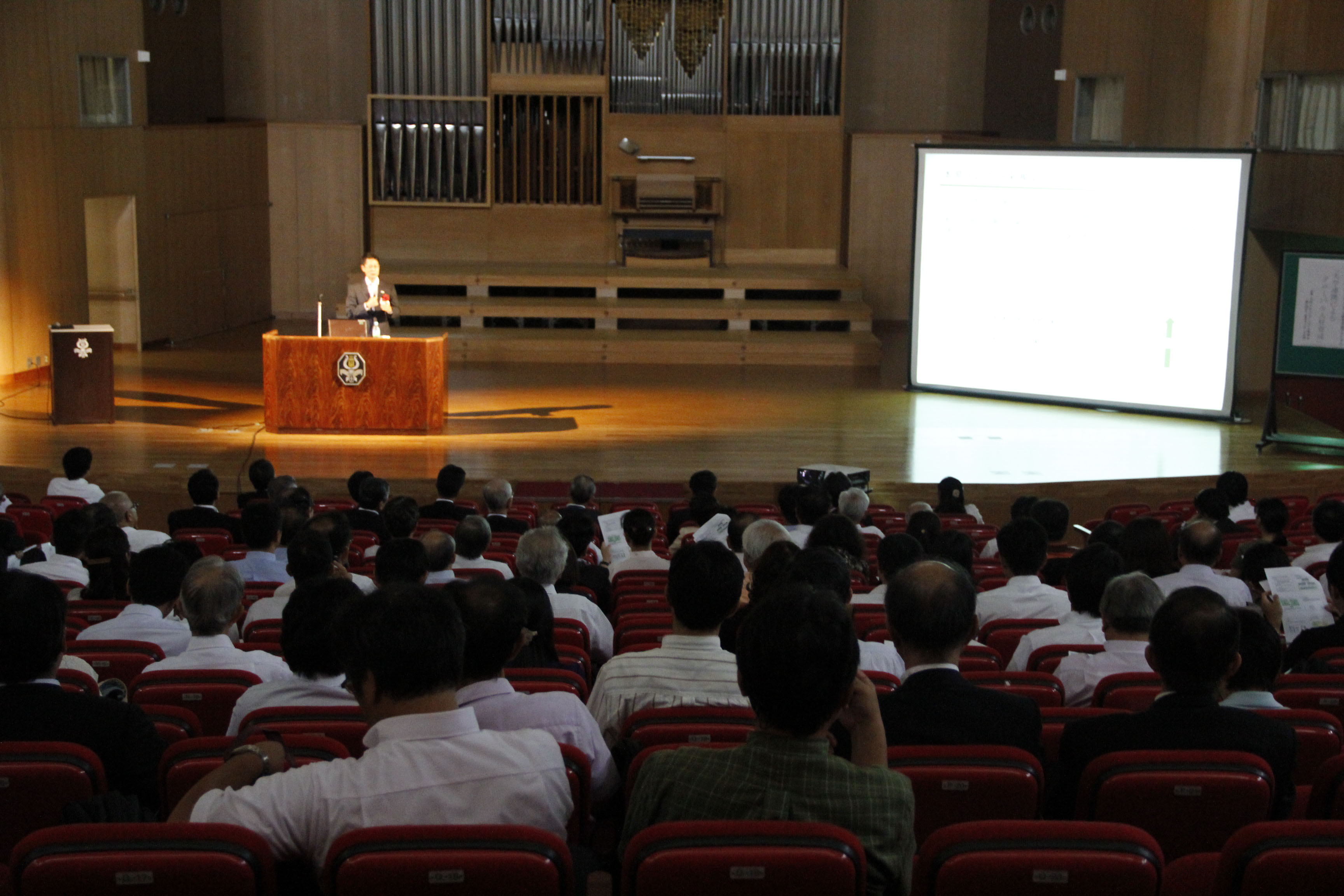
- ▽Scenes from the symposium
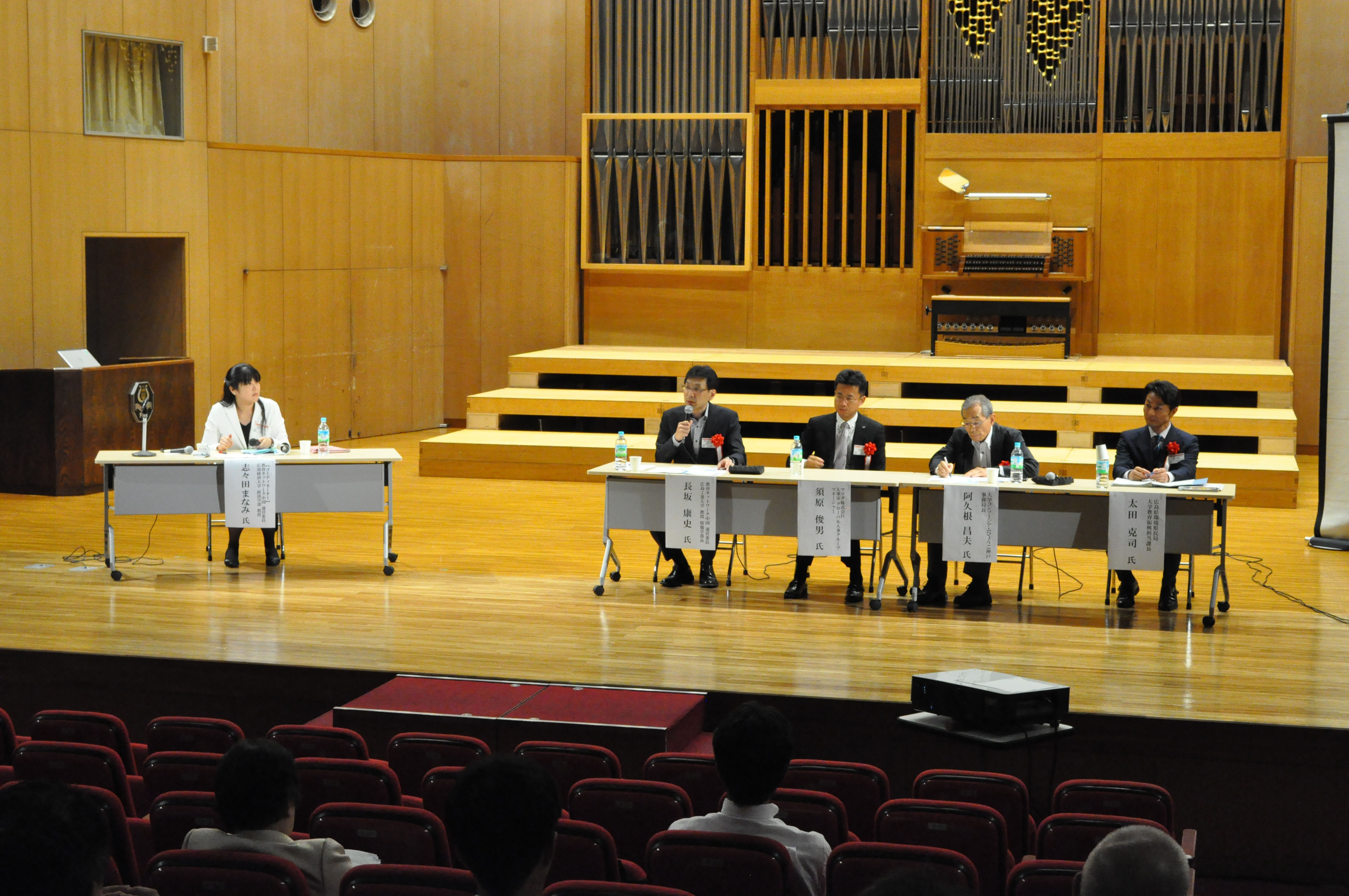
The symposium also featured three topics presented from the perspectives of government, business, and academia: “A new educational program through university collaboration: ‘The image of a manufacturing engineer in the age of globalization,'” “Corporate efforts to develop global human resources,” and “The Hyogo Kobe University Consortium’s global human resources development project.” Lively debate was then held about human resource development efforts in the discussion that followed.
In the subsequent report on education administration, Mr. Yoshihiko Tsunoda, Director of the University Promotion Division, Higher Education Bureau, Ministry of Education, Culture, Sports, Science and Technology, reported on the trends of higher education policy.
In addition, in the poster session held in parallel with the symposium, each consortium organization and three companies, Shimizu Corporation, Japan System Technology Co., Ltd., and Muroo Systems Co., Ltd., exhibited their works, and participants asked many questions and gave their impressions, and there were scenes of active interaction between the exhibitors and participants.
- ▽Report on education administration
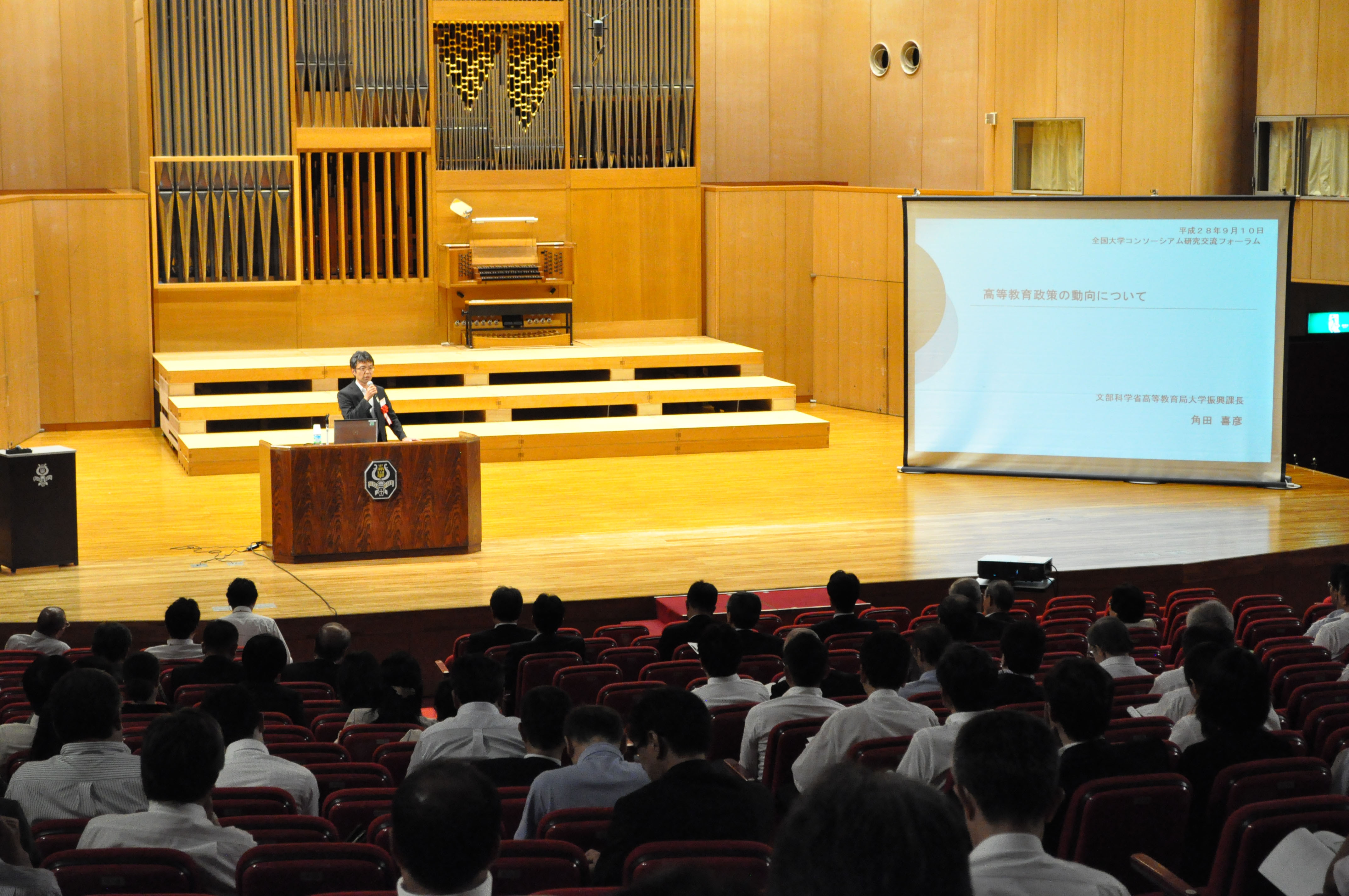
- ▽ Poster Session (20 exhibitors)
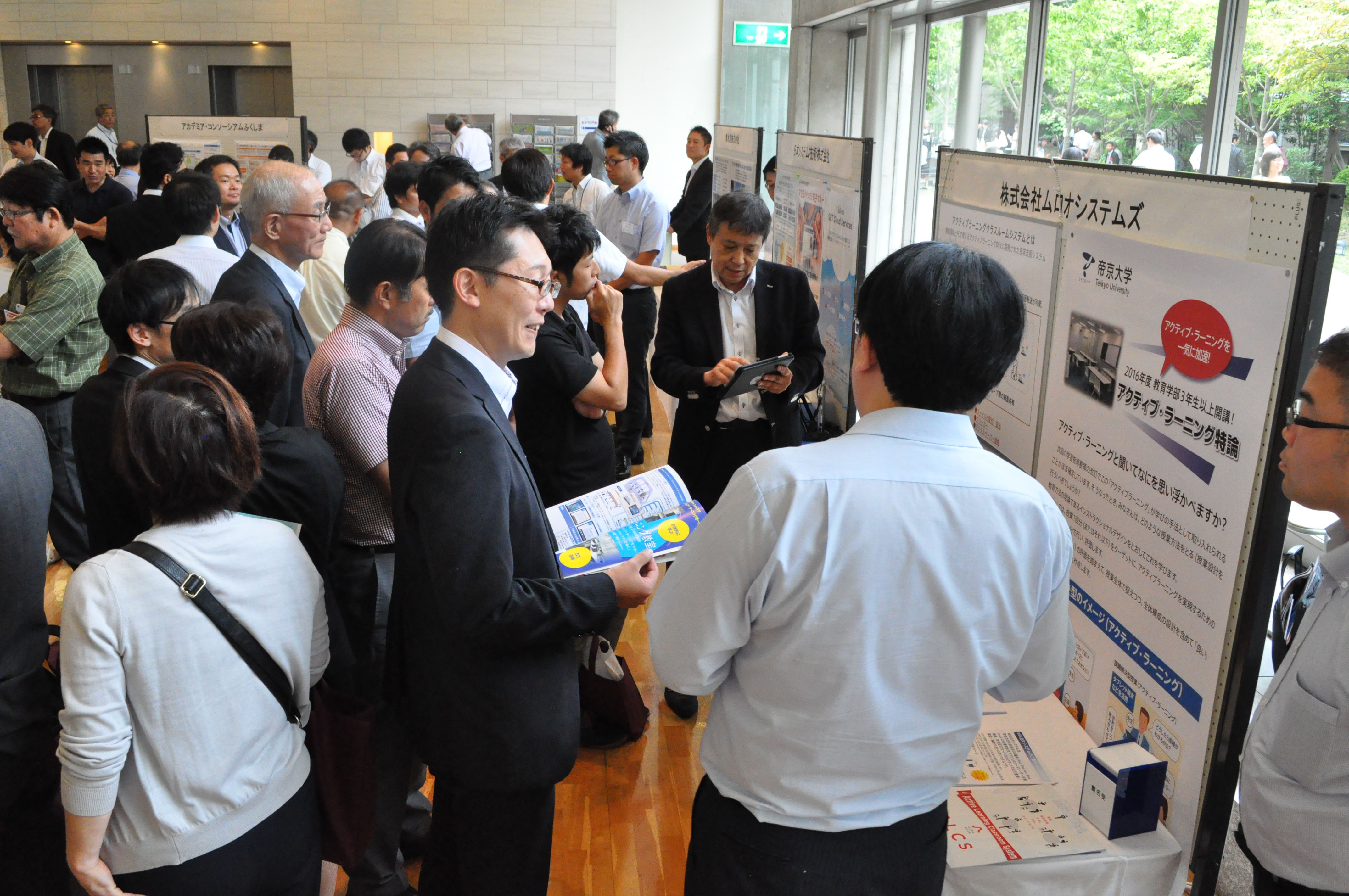
On the second day, four breakout sessions were held covering a variety of themes relating to universities and inter-university collaboration, including “Methods and challenges for cultivating global human resources who can truly function in society,” “Exploring the form of FD/SD through university collaboration in response to changes in the environment surrounding universities,” “The current state and future of regional collaboration projects,” and “Employment and career support for international students.” Practical case studies were reported and participants exchanged opinions, among other things.
- ▽Scenes from the subcommittees (all four subcommittees)
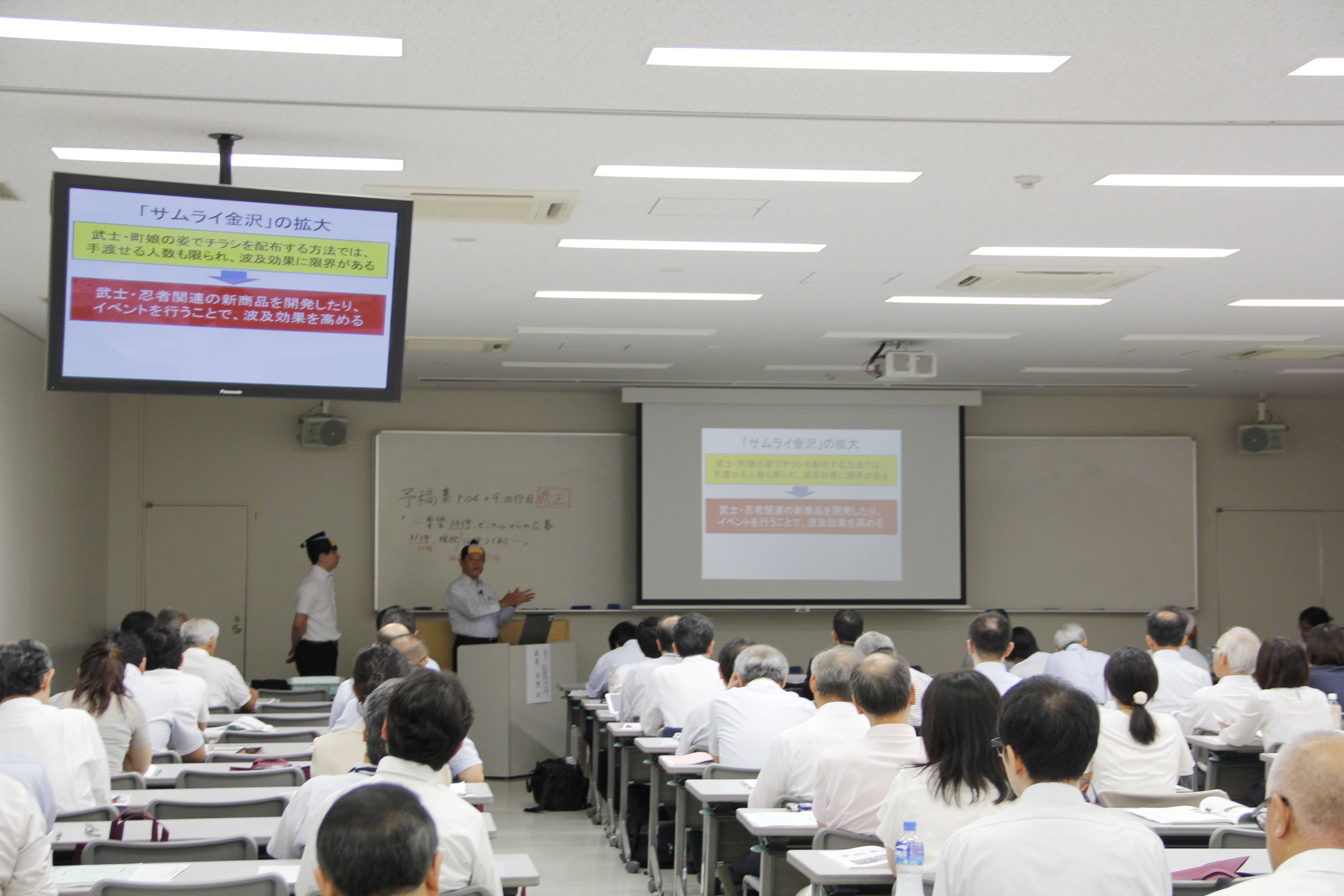
The next 14th forum is scheduled to be held in Okinawa in October 2017. Details will be posted on the University Consortium Kyoto website as soon as they are decided.
We hope you will consider attending.














